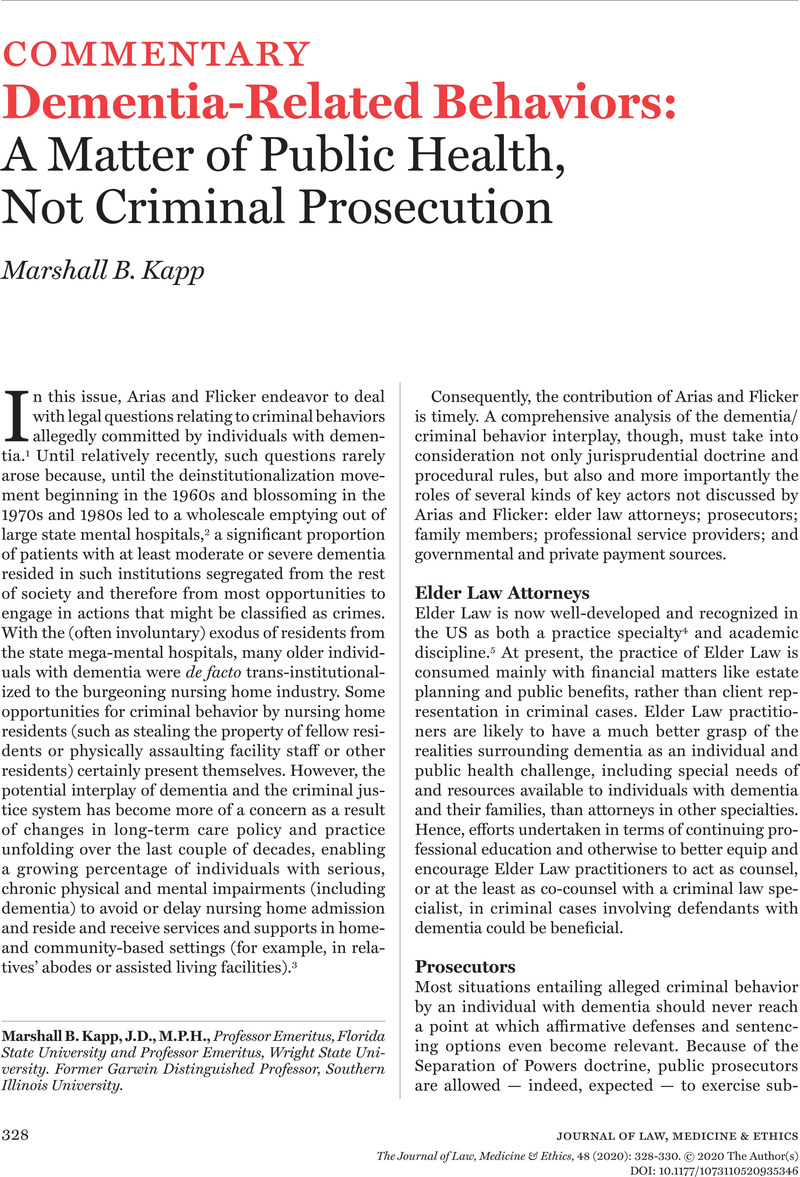No CrossRef data available.
Article contents
Dementia-Related Behaviors: A Matter of Public Health, Not Criminal Prosecution
Published online by Cambridge University Press: 01 January 2021
Abstract
An abstract is not available for this content so a preview has been provided. Please use the Get access link above for information on how to access this content.

- Type
- Independent Articles: Commentary
- Information
- Journal of Law, Medicine & Ethics , Volume 48 , Issue 2: Opioid Controversies: The Crisis — Causes and Solutions , Summer 2020 , pp. 328 - 330
- Copyright
- Copyright © American Society of Law, Medicine & Ethics 2020
References
Arias, J. J. and Flicker, L. S., “A Matter of Intent: A Social Obligation to Improve Criminal Procedures for Individuals with Dementia,” Journal of Law, Medicine & Ethics 48, no. 2 (2020): 318-327.CrossRefGoogle Scholar
Grob, G.N., From Asylum to Community: Mental Health Policy in Modern America (Princeton, NJ: Princeton University Press 1991): at 240-272.Google Scholar
Watson, S. D., “From Almshouses to Nursing Homes to Community Care: Lessons from Medicaid's History,” Georgia State University Law Review 26, no. 3 (2010): 937-969; Hado, E. and Komisar, H., AARP Public Policy Institute Fact Sheet 648, Long-Term Services and Supports (August 2019), available at <https://doi.org/10.26419/ppi.00079.001> (last visited May 1, 2020).Google Scholar
See National Academy of Elder Law Attorneys, available at <www.naela.org> (last visited May 1, 2020).+(last+visited+May+1,+2020).>Google Scholar
Kohn, N. A. and Spurgeon, E. D., “Elder Law Teaching and Scholarship: An Empirical Analysis of an Evolving Field,” Journal of Legal Education 59 (2010): 414-431.Google Scholar
“Prosecutorial Discretion,” Georgetown Law Journal Annual Review of Criminal Procedure 48 (2019): 279-292.Google Scholar
Frankish, H. and Horton, R., “Prevention and Management of Dementia: A Priority for Public Health,” Lancet 390, no. 10113 (2017): 2614-2615.Google Scholar
Richards, E. P., “Public Policy Implications of Liability Regimes for Injuries Caused by Persons with Alzheimer's Disease,” Georgia Law Review 35, no. 2 (2001): 621-660, at 622.Google Scholar
Poisal, K. and Jensen, K., Medicaid 201: Home and Community Based Services, Center for Medicare & Medicaid Services (August 27, 2019), available at <http://www.advancingstates.org/sites/nasuad/files/hcbs/files/4%20-%20Medicaid%20201%20presentation%202019%20DLTSS%20DBC%20draft.pdf> (last visited May 1, 2020).Google Scholar
McGarry, B. E. and Grabowski, D. C., “What Do Physicians Caring for Aging Patients Need to Know About Private Long-Term Care Insurance?” Journal of the American Geriatrics Society 67, no. 10 (2019): 2167-2173.Google Scholar
Zeisel, J., Reisberg, B., Whitehouse, P., Woods, R., and Verheul, A., “Ecopsychosocial Interventions in Cognitive Decline and Dementia: A New Terminology and a New Paradigm,” American Journal of Alzheimer's Disease and Other Dementias 31, no. 6 (2016): 502-507.Google Scholar
See Kapp, M. B., “Old Age is No Time to Be Doing Time,” Journal of the American Geriatrics Society 62, no. 4 (2014): 775-776.Google Scholar




